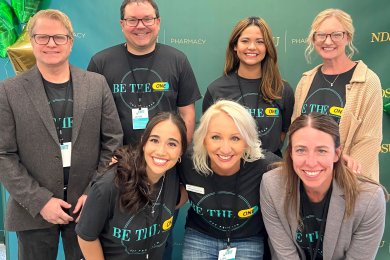Faculty in the Departments of Coatings and Polymeric Materials, Physics and Pharmaceutical Sciences recently won several research grants from the National Science Foundation and the National Institutes of Health. The $1.2 million in funding will support research and training activities focused on a wide range of practical problems related to materials and nanotechnology.
Andriy Voronov, principal investigator and associate professor of coatings and polymeric materials, and Scott Pryor co-principal investigator, and associate professor of agricultural and biosystems engineering, received NSF funding to study how polymers can be used to improve the production of biofuels. The project, “Collaborative Research: Engineering of Recoverable Cellulosomes for Biomass Conversion,” received $191,934 in funding through Award No. 1604422. The project will develop new approaches for the encapsulation of enzymes so that they can be collected and reused multiple times. The research will contribute to the sustainable, industrial-scale production of transportation biofuels from plants.
Erik Hobbie, principal investigator and professor and director of physics; Alan Denton, co-principal investigator and associate professor of physics; and Alexander Wagner, co-principal investigator and associate professor of physics, were awarded NSF funds to study new approaches to the assembly of colloidal silicon nanocrystals, or “quantum dots,” into highly ordered films and structures for applications in light-emitting diodes (LEDs), solar cells and fluorescent labels. The project, “Fluid-Mediated Assembly of Nanocrystalline Silicon,” received $325,571 in funding in Award No. 1603445. Silicon nanocrystals represent a non-toxic, abundant alternative to nanomaterials that may contain heavy metals or are rare and expensive. The research will address technological hurdles that limit their use in emerging technologies.
Sanku Mallik, principal investigator and professor of pharmaceutical sciences, and Amanda Brooks, co-principal investigator and assistant professor of pharmaceutical sciences, received $251,750 through NSF Award No. 1625704 for the acquisition of an ultrasound imaging system. The project, “MRI: Acquisition of a High-Resolution Ultrasound Imaging Instrument for Research and Education,” will enable researchers at NDSU and the University of North Dakota to explore the structure and interactions of biological and non-biological materials, such as 3D-printed scaffolds for cell and tissue cultures. It also will be used as a teaching platform on both campuses.
Yongki Choi, principal investigator and assistant professor of physics, was awarded NIH funds to create novel electronic devices for the detection and manipulation of single protein molecules, which will assist the discovery of novel antibacterial agents. The project, “Developing a Hybrid Biomolecule Nano-Circuit Approach for Observing and Manipulating Single Protein Dynamics,” received $423,892 in funding through Award No. R15GM122063. The research will help establish a structural basis for the design of compounds that can suppress drug-resistant pathogens, while creating a novel platform for diagnostic devices to bridge electronics and biochemistry.
As a student-focused, land-grant, research university, we serve our citizens.



